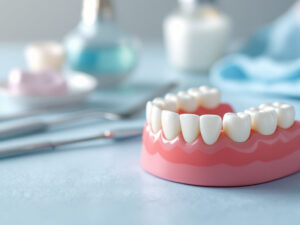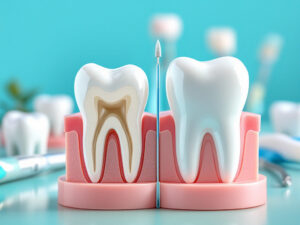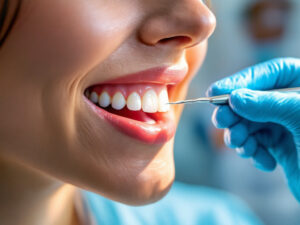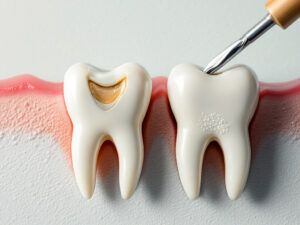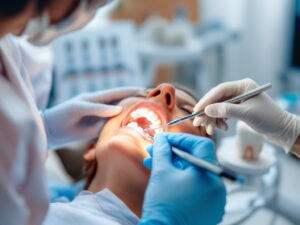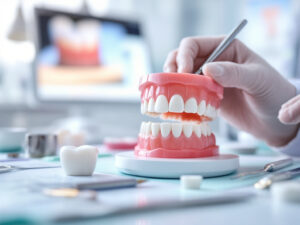A knocked out tooth is one of the most urgent dental emergencies you can face. When this occurs, seeking knocked out tooth treatment as quickly as possible can save you from long-term complications such as bone loss, infection, or even permanent gaps in your smile. Whether it happens due to an accident during sports, a trip-and-fall, or unexpected impact, the key is acting calmly and swiftly. In many cases, a tooth that is completely knocked out (known as an avulsed tooth) can be replanted to preserve your natural smile, but time is of the essence. By understanding the steps to take in this crisis, you can better protect your overall oral health and reduce the risk of needing more extensive procedures down the road.
In this article, you will learn the most critical first steps to take after a tooth is knocked out, find out how a dentist re-implants the tooth, and discover the follow-up care required for the best chance of success. You will also see why Cloninger Dentistry, proudly serving families with comprehensive care, can be an ideal choice for both immediate and long-term dental needs.
Understand knocked out tooth
A tooth becomes “knocked out” if it is forcibly dislodged from its socket. Such incidents commonly occur during contact sports, automobile collisions, or sudden falls. According to the Cleveland Clinic (Cleveland Clinic), more than five million teeth are avulsed annually in children and adults, with most occurrences involving the front incisors. Regardless of which tooth is affected, knowing the basics of knocked out tooth treatment makes a profound difference in saving your smile.
Why quick action matters
The success rate of reimplanting a tooth hinges on acting quickly. Ideally, you want to see a dentist or endodontist within 30 minutes of the incident to give the tooth the best chance of survival. Reimplantation times beyond one hour reduce the odds significantly, but teeth handled and stored correctly (for example, in milk) may still have a chance even up to 60 minutes later. Understanding this timeframe underscores why prompt attention is so critical. If you or a loved one has a tooth knocked out, this is truly “the sooner, the better” scenario.
Common reasons for failure
Even if you hurry to your dentist, certain mistakes can jeopardize the tooth’s viability:
- Touching or scrubbing the root surface.
- Letting the tooth dry out.
- Handling the tooth by the root rather than the crown.
- Delay in seeking immediate dental care.
These errors may damage the delicate periodontal ligaments, drastically lowering the odds of a successful reimplantation. By learning how to avoid these pitfalls, you keep your reimplantation prospects much higher.
Know which teeth can be replanted
While adult teeth (permanent teeth) can be replanted, primary (baby) teeth typically should not be. An attempt to force a baby tooth back into its socket can harm the underlying permanent tooth that has not yet erupted. In children, always consult with a pediatric dental professional instead of trying to replace a baby tooth.
Avoid common pitfalls
When you see or experience a tooth being completely avulsed, panic or confusion is normal. However, clarity on immediate storage and handling can save the tooth from additional damage. Below are the main pitfalls to avoid, helping ensure the best possible outcome when you finally reach a dentist.
Damaging the root
The root surface consists of living cells that need to remain intact for effective reimplantation. Resist the urge to scrub away any visible dirt unless specifically advised by a dental professional. Rinsing gently in milk or saline solution is your safest bet. Meanwhile, keep your fingers on the chewing surface (the crown) of the tooth—never the root—so the living tissues remain undisturbed.
Letting the tooth dry out
A knocked out tooth must stay moist. The ideal storage medium is milk, which provides necessary proteins and antibacterial properties that can keep cells alive for a period of time (Cleveland Clinic). If milk is unavailable, you could store the tooth:
- In your mouth, against the cheek (for adults only).
- In a specialized tooth-preservation kit.
- In a saline solution if accessible.
Tap water is not suggested because it can damage the root cells. Preserving moisture is more important than you might think. Allowing the tooth to dry can kill the cells required for the reattachment process.
Ignoring immediate professional help
Some individuals ignore dental appointments after re-inserting the tooth on their own. However, professional care is absolutely critical, even if you manage to place the tooth back in the socket. Dentists evaluate additional damage, stabilize the tooth in place using splints, and monitor for possible infections or further complications. Without timely professional intervention, the tooth is at a higher risk of eventually failing.
Act promptly to save teeth
If your tooth is knocked out, remain calm but act quickly. Whether you do the immediate reinsertion yourself or simply keep the tooth safe until you get to the dentist, each step is crucial. Below are specific recommendations that can maximize the tooth’s survival rate.
Step 1: Retrieve and handle gently
Locate the tooth immediately, pick it up by the crown, and refrain from touching the root. If your tooth fell onto a non-sterile surface (like pavement or dirt), lightly rinse it in milk if visible debris is present. Do not wipe or scrub it, as vigorous cleaning can harm the tissues on the root.
Step 2: Attempt re-insertion (if it’s an adult tooth)
If you feel comfortable, try to gently push the tooth back into the socket. Using light pressure, align the tooth with existing teeth. This approach best preserves the vitality of the ligaments and tissues. If you face resistance or severe pain, do not force it. Proceed to store the tooth in milk or in your cheek if storing in mouth is safe for you. Remember never to attempt reinserting a baby tooth. For children’s dental emergencies, you should head straight to a dentist offering pediatric dental care to avoid potential harm to developing permanent teeth.
Step 3: Keep the tooth moist
For knocked out tooth treatment, moisture is essential. If immediate re-insertion isn’t possible, place the tooth in a leakproof container of milk, ideally. Studies confirm that milk has a protein content that helps maintain the cells required for successful reimplantation. In a pinch, you can gently store the tooth in your mouth next to the cheek, but only if you can do so safely without swallowing or choking on it.
Step 4: Seek professional dental care
Drive or get a ride to the nearest dentist or endodontist as soon as possible. If you’re near Cloninger Dentistry, we will do everything we can to accommodate same day dental appointment requests for emergencies like these. Every minute counts in preserving your tooth. Letting an hour or more pass lowers the chance of successful reattachment, although it might still be worth attempting if the tooth has been stored properly.
What to expect from dentists
When you arrive for professional help, your dentist, periodontist, or endodontist will jump into action. Their steps may include evaluating your oral status, taking an X-ray, and gently repositioning the tooth in its socket if it’s not already there. Then they will stabilize the tooth with a splint and closely monitor for infection in the days and weeks afterward.
Diagnostic tests and imaging
Most likely, your dentist will begin with a clinical evaluation, using digital xray imaging or 3d imaging dental diagnostics to see any fractures in the tooth structure or jawbone. If you managed to reinsert the tooth yourself, the dental team will confirm the alignment. You may also receive an intraoral camera examination so the dentist can visually inspect the tissues and neighboring teeth. Identifying any damage or fractures early on is key to designing an appropriate treatment plan.
Repositioning and stabilization
Should the tooth need repositioning, your dentist will carefully place it in the proper alignment. A splint—often made of a thin wire or a flexible material—will secure the knocked out tooth to adjacent teeth. According to NHS Inform (NHS Inform), a splint may be left in place for about two weeks, but this period can vary based on the extent of the trauma. During this time, you must avoid chewing hard foods or applying extra pressure to the affected area.
Potential need for root canal therapy
A reimplanted tooth may develop complications if the tooth’s pulp, which contains nerves and blood vessels, suffers irreversible damage. In such cases, root canal therapy is often necessary. This procedure, sometimes referred to as “pulp removal,” eliminates infected or necrotic tissue inside the tooth while preserving the outer tooth structure. As the American Association of Endodontists (AAE) notes, an endodontist can often save a reimplanted tooth for many years if treatment is timely. Occasionally, if the reimplanted tooth does not survive long term, additional procedures such as dental crown placement or dental bridge placement may become necessary.
Monitoring and follow-up
Replanted teeth need consistent follow-up to confirm healing, spot infections, and assess bone regeneration around the tooth. Your dentist may schedule regular checkups for several months to ensure there are no signs of root resorption (where the body starts reabsorbing the tooth’s root) or gingival infection. If all goes well, you may only need annual visits to track your progress. In general, immediate reimplantation has a much higher chance of success, but ongoing monitoring significantly increases the odds of keeping that tooth functional and comfortable.
Protect your smile for life
Prevention and proactive care help reduce your risk of tooth avulsion and boost your overall oral health. Accidents can happen, but equipping yourself with the right knowledge and devices can lessen the likelihood of losing a tooth unexpectedly.
Wear a mouthguard
A well-fitted mouthguard is especially critical if you play contact sports or enjoy high-intensity recreational activities. Custom mouthguards that a dentist makes or fits specifically for you offer better coverage and retention than over-the-counter versions. The dentist’s mold ensures the guard covers critical areas and won’t cause discomfort. An ill-fitting mouthguard might slip out of place during a collision, leaving your teeth vulnerable.
Maintain strong oral hygiene
A tooth weakened by decay or gum disease is at higher risk of complications if it’s ever jostled or partially displaced. Conditions like severe cavities and periodontal issues may reduce the structural integrity of your teeth and gums. By maintaining a regimen that includes professional teeth cleaning, fluoride treatment, and routine dental checkup, you strengthen your teeth and reduce the chances of losing them. Good oral hygiene lays the groundwork for fewer complications should an accident occur.
Invest in regular dental care
Timely dental care can reveal early warning signs of weakness in teeth and gums. Services like oral cancer screening and painless cavity filling work in tandem with routine checkups to ensure any issues with tooth structure or gum health are caught early. Being proactive also helps you avoid bigger, costlier challenges in the future, making it simpler to handle emergencies when they arise. Avoid waiting until you have a severe problem. If you spot cracks or feel unusual sensitivity, seek broken tooth repair or toothache pain relief quickly.
Choose Cloninger Dentistry now
Turning to a trusted and reputable dental practice makes all the difference in managing an unexpected dental emergency. It is precisely during these urgent situations that you want a compassionate yet experienced team on your side, able to accommodate a prompt visit and effectively restore your smile. At Cloninger Dentistry, we are ready to provide you or your loved ones the support necessary for lasting recovery from a knocked out tooth—plus the comprehensive dental services you need to maintain a healthy mouth for the long term.
Comprehensive care for families
We understand that everyone in your household, from young children to seniors, has unique needs. Our wide range of services includes:
- Pediatric dental care
- Tooth extraction service options (both simple tooth extraction and surgical tooth extraction)
- Gum disease treatment for maintaining periodontal health
- Full denture fabrication or partial denture service if you need restorative solutions
By centralizing your family’s dental care with one practice, you can streamline appointments, maintain consistent records, and ensure continuity of care. We believe this approach fosters not only convenience but also peace of mind.
Preventative focus
Knocked out tooth treatment is an emergency intervention, but we also emphasize prevention. By routinely scheduling new patient dental exam or routine dental checkup, you drastically lower the odds of severe infection or decay that can complicate reimplantation if a tooth is ever knocked out. Prevention spans everything from tooth sensitivity treatment to periodontal maintenance cleaning. Each step is designed to keep your teeth and gums robust, boosting your confidence that you can handle a dental emergency should one occur.
Swift emergency dental care
Handling a tooth avulsion is time-sensitive. That’s why our emergency dental care team strives to see you as quickly as possible. We also offer same day dental appointment slots for urgent matters whenever feasible. When you visit Cloninger Dentistry, you can expect:
- Prompt assessment with digital xray imaging
- Thorough cleaning or rinsing of the traumatized area
- Stabilization of the tooth if reimplantation is feasible
- Ongoing follow-up appointments to ensure healing
We make it a point to equip our patients with the right resources, from immediate care instruction to dedicated phone support if you have further questions after your procedure.
Expert cosmetic dentistry
Sometimes, despite best efforts, a reimplanted tooth may not survive over time. We are also here to help with additional cosmetic or restorative solutions if they become necessary. Our offerings include porcelain crown service, dental bridge placement, and even snap in denture service to restore your smile’s aesthetics and function. Whether your ultimate outcome includes a saved natural tooth or a new prosthetic, we strive to ensure you are comfortable, informed, and confident every step of the way.
Financial transparency
We prioritize clarity around pricing, insurance, and potential payment plans. As an insurance friendly dental practice, we coordinate directly with your provider to reduce out-of-pocket costs. Where applicable, we also offer flexible financing dental options so that you can handle emergencies and routine care without unnecessary stress. Our team will always provide a written treatment estimate prior to major procedures, so you remain fully informed and prepared.
Frequently asked questions
1. Can I reinsert a knocked out tooth myself?
Yes, it is possible to manually place an adult tooth back into the socket if you are confident about positioning it correctly. Hold the tooth by the crown, align it carefully, and apply gentle pressure. However, if you experience pain, resistance, or are dealing with a child’s baby tooth, avoid forcing it back in place. In every case, follow up immediately with emergency dental care to give your tooth the best odds of successful reintegration.
2. What if I cannot place the tooth back into the socket?
If replacing the tooth in the socket isn’t feasible, store it in milk or hold it gently in your mouth between your cheek and gums, provided you can do so without swallowing or choking. Avoid storing it in water. Tools like over-the-counter tooth preservation kits are also an option. Then contact a dental practice like Cloninger Dentistry right away.
3. How long can a tooth survive outside the mouth?
Ideally, reimplantation should take place within 30 minutes for best results, although a window of up to 60 minutes may still be viable if the tooth has been kept moist in milk or a suitable medium. Beyond an hour, the success rate drops. Nevertheless, some teeth are saved even after extended periods due to correct handling. Always bring the tooth to your dentist for an evaluation, even if you think too much time has passed.
4. Do I need a root canal for a knocked out tooth?
It depends on whether the pulp inside the tooth was irreversibly damaged. Often, a tooth that has been out of the mouth for a significant time or has had its nerve compromised will require root canal therapy. During follow-up, your dentist will determine the tooth’s vitality. If the tooth’s nerve shows signs of infection or necrosis, a root canal might be necessary to prevent further damage.
5. Is there a chance I will lose the tooth eventually?
Even when successfully replanted, a knocked out tooth may not last forever. Long-term stability depends on many factors, including how quickly the tooth was reinserted, how well it was splinted, your overall oral health, and follow-up care. If the tooth fails later, restorative options like dental bridge placement or custom denture fitting can help you maintain a comfortable, natural-looking smile.
Acting quickly, handling the tooth properly, and consulting a trusted dentist are the cornerstones of successful knocked out tooth treatment. By following best practices and avoiding harmful mistakes, you greatly increase the likelihood of preserving your natural tooth. Even if a complete save is not always possible, modern dentistry offers robust restorative and cosmetic solutions to keep you confident in your appearance and oral function.
Cloninger Dentistry is here to help you navigate every stage of your dental care, from prevention and emergency response to long-term maintenance. We believe that personalized attention, advanced diagnostics, and a genuine understanding of your concerns all create the supportive environment you need for lasting results. With our comprehensive family and cosmetic services, you can trust us to address your immediate issues while guiding you toward a healthier future for your smile. If you face a tooth avulsion or any other dental crisis, contact our practice without delay, and let us put years of expertise and compassion to work for you.


